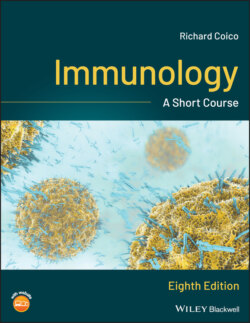Читать книгу Immunology - Richard Coico - Страница 29
BENEFITS OF IMMUNOLOGY
ОглавлениеWhile we have thus far discussed the theoretical aspects of immunology, its practical applications are of paramount importance for survival and must be part of the education of students.
The field of immunology has been in the public limelight since the successful use of polio vaccines in the mid‐twentieth century. Today, vaccines almost completely eliminate a host of childhood diseases in the United States and other industrialized nations, including those that prevent measles, mumps, chickenpox, pertussis (whooping cough), polio, and tetanus. Advances in the field of immunology with expanded knowledge regarding mechanisms of organ and tissue rejection and tolerance have ushered in successful life‐saving efforts in transplantation of major organs such as heart, liver, pancreas, and kidney, just to name a few. More recently, public interest in immunology has intensified with the use of monoclonal antibodies used in a variety of clinical applications including diagnostic, surgical mapping, and direct (e.g., tumor specific) or indirect (immune system targeted) therapy. It is noteworthy that the Nobel Prize was awarded in 1984 to Köhler and Milstein for their technological advances in the development of monoclonal antibodies and them in 2018, James Allison was awarded the Nobel Prize for launching an effective new way to attack cancer by treating the immune system rather than the tumor.
The innate and adaptive immune systems play an integral role in the prevention of and recovery from infectious diseases and are, without question, essential to the survival of the individual. Metchnikoff was the first to propose in the 1800s that phagocytic cells formed the first line of defense against infection and that the inflammatory response could actually serve a protective function for the host. Indeed, innate immune responses are responsible for the detection and rapid destruction of most infectious agents that are encountered in the daily lives of most individuals. We now know that innate immune responses operate in concert with adaptive immune responses to generate antigen‐specific effector mechanisms that lead to the death and elimination of the invading pathogen. Chapter 19 presents information concerning how our immune systems respond to microorganisms and how methods developed to exploit these mechanisms are used as immunoprophylaxis.
Vaccination against infectious diseases has been an effective form of prophylaxis. Immunoprophylaxis against the virus that causes poliomyelitis has significantly reduced the incidence of this dreadful disease. Indeed, the previously widespread disease smallpox has been eliminated from the face of the Earth. The last documented case of natural transmission of smallpox virus was in 1972. Unfortunately, the threat of biological weapons has prompted new concerns regarding the reemergence of certain infectious diseases, including smallpox. Fortunately, public health vaccination initiatives can be applied to prevent or significantly curtail the threat of weaponized microbiological agents.
